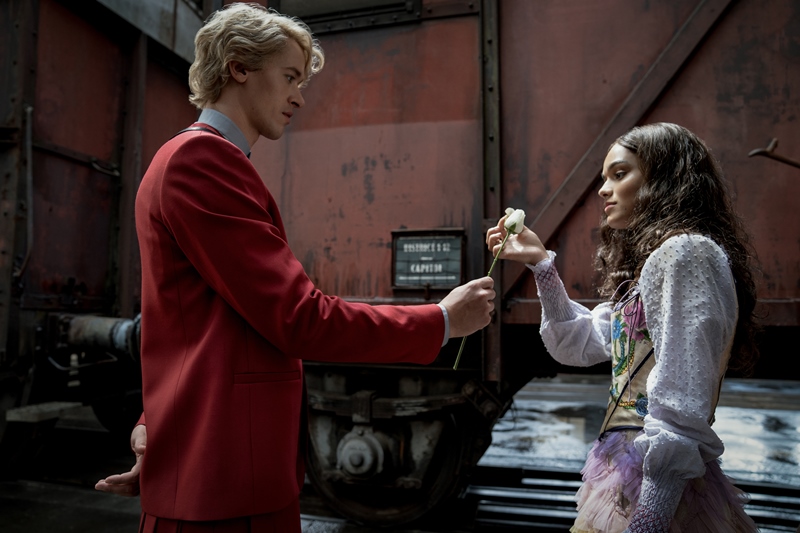Review: ‘The Hunger Games: The Ballad of Songbirds & Snakes’ lacks the substance of its source material

A scene from ‘The Hunger Games: The Ballad of Songbirds & Snakes’ courtesy of Lionsgate Entertainment
‘The Hunger Games: The Ballad of Songbirds & Snakes’ is the cursory origin story of the series’ president and modern-day Games.
The roots of most large-scale atrocities are power and control. Whether it’s a way of getting it or exerting it is irrelevant. This is unequivocally true of the Hunger Games, which were implemented to maintain dominance over the districts and remind them of the Capitol’s ruthless authority. However, the original trilogy begins with the 74th annual Games, followed by the event’s diamond anniversary, featuring the grandchildren of people who were barely old enough to remember the war that started it all. But how did the Games evolve into the grand spectacle that would make Katniss Everdeen a reluctant hero? The Hunger Games: The Ballad of Songbirds & Snakes returns to the early days of the Games to shed some light.
Coriolanus Snow (Tom Blyth) comes from a proud line of aristocrats who can now barely scrape together a meal, secretly living in poverty to uphold the family name. His cousin, Tigris (Hunter Schafer), works in fashion, while their Grandma’am (Fionnula Flanagan) tends to her rooftop rose garden, but the burden of raising the Snows up from the ashes rests on Coriolanus’ shoulders. His only chance is winning an Academy prize awarded to the top graduating student, which will greatly depend on the results of the 10th annual Hunger Games as this is the first year students will act as mentors to the tributes. Initially disappointed to be stuck with the District 12 girl, Coriolanus’ hopes are lifted when he sees an attractive and spirited Lucy Gray Baird (Rachel Zegler) take the Reaping stage.
The Hunger Games trilogy (four movies, having split the last book into two films) is a fascinating examination of survival and cruelty. The Gamemakers spent decades perfecting the arena for maximum “entertainment,” but it was not always so. This prequel occurs when interest in the Games is at an all-time low across Panem as what little appeal watching children kill each other had was lost. However, trying to squeeze nearly 500 pages of growth and evolution into a single movie, even one that’s 157 minutes, is a tall order. Thus, the storyline is very truncated with weeks squeezed into a mere few days and the final act so condensed, it loses all meaning.
The book traces Coriolanus’ maturation under the watchful eye of Head Gamemaker Dr. Gaul (Viola Davis) and scornful gaze of Dean Highbottom (Peter Dinklage). He begins a boy preoccupied with his family’s future, vigilant to never give anyone the upper hand. Then a strategy turns into ill-fated love and an acquaintance becomes a loyal but troublesome friend. By the end, one can see the cold-hearted Snow who would become president and death dealer. Unfortunately, that transformation is lost in the film as most of Coriolanus’ motivations and fears never clearly make it to the screen. There’s much to be interpreted, but not enough time to show how the somewhat rebellious boy became a hardline Capitol man.
Music has consistently been an important part of the series and with Lucy Gray’s performance background, it’s even more central to this story. Notably, the origin of the song, “The Hanging Tree,” is revealed in this narrative. The first two acts deliver expectedly as the mentors get to know their unenthusiastic assignments and the tributes are treated like animals going to the slaughter — a stark contrast to the star treatment received by Katniss and her cohorts. The Hunger Games are action-packed with added confrontations and malice, as well as a couple of surprise intrusions that prune the number of tributes hunting Lucy Gray. But Coriolanus’ behaviour in the final act is difficult to understand, dragging down the narrative and making him seem erratically callous when it’s far more complicated.
The roles are generally well cast with somewhat fresh faces playing the two leads. Blyth fills Coriolanus’ shoes, though he’s saved from portraying the more challenging aspects of his character. Zegler is the beautiful songbird, though most of her autonomy is removed in favour of making Coriolanus her hero. Dinklage is the epitome of a self-loathing and hateful man, while Davis emphasizes Gaul’s cunningness over her more distressing qualities and Jason Schwartzman runs with the superficial and overdramatic TV host, Lucky Flickerman. But it’s unfortunate some of the livelier characters didn’t make the cut, namely the local black market merchant, Pluribus Bell, and Sejanus’ “Ma.”
Adaptations, particularly those based on books that primarily use inner dialogue, are difficult and although this picture hits all the novel’s major events, there is definitely something lost in translation, which could in turn leave some viewers in the dark. After receiving criticism for splitting Mockingjay into two films, returning director Francis Lawrence dismissed the idea of breaking up this book into multiple films — a poor rationale and detriment to the narrative.
Director: Francis Lawrence
Starring: Rachel Zegler, Tom Blyth and Viola Davis
Review: ‘The Hunger Games: The Ballad of Songbirds & Snakes’ lacks the substance of its source material
#Review #Hunger #Games #Ballad #Songbirds #Snakes #lacks #substance #source #material





